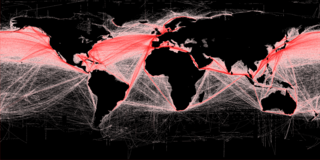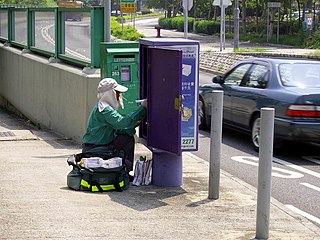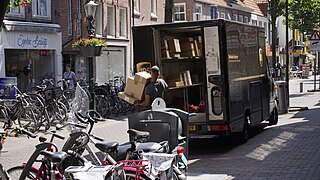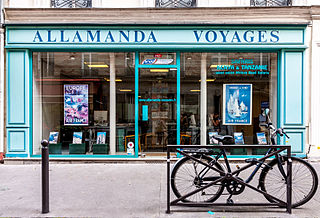
Freight transport, also referred to as freight forwarding, is the physical process of transporting commodities and merchandise goods and cargo. The term shipping originally referred to transport by sea but in American English, it has been extended to refer to transport by land or air as well. "Logistics", a term borrowed from the military environment, is also used in the same sense.

The United States Postal Service (USPS), also known as the Post Office, U.S. Mail, or simply the Postal Service, is an independent agency of the executive branch of the United States federal government responsible for providing postal service in the United States, its insular areas and associated states. It is one of a few government agencies explicitly authorized by the Constitution of the United States. As of 2023, the USPS has 525,469 career employees and 114,623 non-career employees.

The mail or post is a system for physically transporting postcards, letters, and parcels. A postal service can be private or public, though many governments place restrictions on private systems. Since the mid-19th century, national postal systems have generally been established as a government monopoly, with a fee on the article prepaid. Proof of payment is usually in the form of an adhesive postage stamp, but a postage meter is also used for bulk mailing.

United Parcel Service, Inc. (UPS) is an American multinational shipping & receiving and supply chain management company founded in 1907. Originally known as the American Messenger Company specializing in telegraphs, UPS has expanded to become a Fortune 500 company and one of the world's largest shipping couriers. UPS today is primarily known for its ground shipping services as well as the UPS Store, a retail chain which assists UPS shipments and provides tools for small businesses. UPS offers air shipping on an overnight or two-day basis and delivers to post office boxes through UPS Mail Innovations and UPS SurePost, two services that pass on packages to the United States Postal Service for last-mile delivery.

Package delivery, or parcel delivery, is the delivery of shipping containers, parcels, or high-value mail as single shipments. The service is provided by most postal systems, express mail, private courier companies, and less-than-truckload shipping carriers. Package delivery differs by country due to cost and population. In 2019, for example, China, the United States, and Japan were the top countries in terms of package delivery volume while Latvia, Macau, and Iceland ranked at the bottom. This can be explained in part by the population of the bottom three nations totaling 2 million while the top three represent a population of almost 2 billion.

In transportation, freight refers to goods conveyed by land, water or air, while cargo refers specifically to freight when conveyed via water or air. In economics, freight refers to goods transported at a freight rate for commercial gain. The term cargo is also used in case of goods in the cold-chain, because the perishable inventory is always in transit towards a final end-use, even when it is held in cold storage or other similar climate-controlled facilities, including warehouses.

Registered mail is a postal service in many countries which allows the sender proof of mailing via a receipt and, upon request, electronic verification that an article was delivered or that a delivery attempt was made. Depending on the country, additional services may also be available, such as:

A courier is a person or organization that delivers a message, package or letter from one place or person to another place or person. Typically, a courier provides their courier service on a commercial contract basis; however, some couriers are government or state agency employees.

A travel agency is a private retailer or public service that provides travel and tourism-related services to the general public on behalf of accommodation or travel suppliers to offer different kinds of travelling packages for each destination. Travel agencies can provide outdoor recreation, arranging logistics for luggage and medical items delivery for travellers upon request, public transport timetables, car rentals, and bureau de change services. Travel agencies can also serve as general sales agents for airlines that do not have offices in a specific region. A travel agency's main function is to act as an agent, selling travel products and services on behalf of a supplier. They are also called Travel Advisors. They do not keep inventory in-hand unless they have pre-booked hotel rooms or cabins on a cruise ship for a group travel event such as a wedding, honeymoon, or other group event.

Delivery is the process of transporting goods from a source location to a predefined destination. Cargo is primarily delivered via roads and railroads on land, shipping lanes on the sea, and airline networks in the air. Certain types of goods may be delivered via specialized networks, such as pipelines for liquid goods, power grids for electrical power and computer networks such as the Internet or broadcast networks for electronic information. Car transport is a particular subgroup; a related variant is Autorack, which involves the transport of autos by railroads.

A post office box is a uniquely addressable lockable box located on the premises of a post office.

Less-than-truckload shipping or less than load (LTL) is the transportation of an amount of freight sized between individual parcels and full truckloads. Parcel carriers handle small packages and freight that can be broken down into units less than approximately 150 pounds (68 kg). Full truckload carriers move entire semi-trailers. Semi-trailers are typically between 26 and 53 feet and require a substantial amount of freight to make such transportation economical. The term LTL can refer to the freight itself, or to the carrier that transports the such freight.
Post offices and other mail service providers typically offer a mail forwarding service, commonly known as hybrid mail or virtual post office box services, to redirect mail addressed to one location to another address – usually for a given period. In the case of the United States Postal Service's First Class Mail, it is generally for a period of one year. British Royal Mail provides a service called Mail Redirection, enabling redirection for up to two years. Customers of such a service usually, but not exclusively, use mail forwarding when they change an address.

A diplomatic courier is an official who secures and transports diplomatic bags. Countries have utilized diplomatic couriers to handle important documents, artifacts and supplies between different countries since the 12th century. Following the 1961 Vienna Convention on Diplomatic Relations, couriers are placed under diplomatic immunity while performing their work. Couriers are usually hired by a specific country and are tasked with protecting and managing bags from being opened. Some couriers are assigned on an ad hoc basis, but in those cases they are released from immunity once their bags have been delivered. The original definition of a diplomatic courier focuses on handling bags, but couriers today also deal with logistical affairs and digital communications.
South African Post Office is the national postal service of South Africa and as a state owned enterprise, its only shareholder is the South African government. In terms of South African law, the Post Office is the only entity that is legally allowed to accept reserved mail, and as such, it operates a monopoly. It employs over 16,480 people and operates more than 1,400 postal outlets throughout the country and therefore has a presence in almost every single town and city in South Africa. Nomkhita Mona joined the SA Post Office in April 2021 as group CEO. Its main subsidiary is Postbank, a financial services provider.

An e-mail agent is a program that is part of the e-mail infrastructure, from composition by sender, to transfer across the network, to viewing by recipient. The best-known are message user agents and message transfer agents, but finer divisions exist.

Shared transport or shared mobility is a transportation system where travelers share a vehicle either simultaneously as a group or over time as personal rental, and in the process share the cost of the journey. It is a transportation strategy that allows users to access transportation services on an as-needed basis, and can be regarded as a hybrid between private vehicle use and mass or public transport. Shared mobility is an umbrella term that encompasses a variety of transportation modes including carsharing, Bicycle-sharing systems, ridesharing companies, carpools, and microtransit.

Shipping Wars is an American reality television series that aired on A&E from January 10, 2012, to April 29, 2015. Season 9 premiered on November 30, 2021, with a new cast of shippers. The show follows various independent shippers who have discovered that money can be made transporting large/bulky/unusual items that traditional carriers either cannot or will not haul. They compete for shipments in timed auctions held by uShip, one of the largest online auction houses for independent shippers.
Mail storage is a type of on-demand self storage whereby customers send items by mail or delivery service to be stored at a central location. It may be a viable option for people who prefer 'pay-as-you-go' storage, in which only items that are stored are charged storage fees, rather than renting a larger storage unit that may not be fully utilized.
Travel health nursing is a nursing specialty which promotes the health and safety of national and international travelers. Similar to travel medicine, it is an interdisciplinary practice which draws from the knowledge bases of vaccines, epidemiology, tropical medicine, public health, and health education. Travel nursing has experienced an increase in global demand due to the evolution of travel medicine. Travel health nursing was recognized during the 1980s as an emerging occupation to meet the needs of the traveling public, and additional education and training was established. Travel health nurses typically work in "private practice, hospital outpatient units, universities, the government, and the military", and have more opportunities and leadership roles as travel has become more common. However, they also experience organizational and support-related conflicts with general practitioners and patients in healthcare settings.















